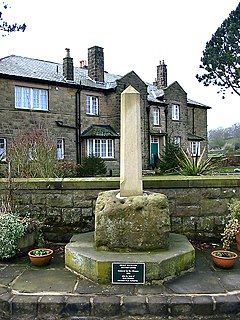Great Hucklow
| Great Hucklow | |
|---|---|
 Great Hucklow Butter Cross |
|
| Great Hucklow shown within Derbyshire | |
| Population | 427 (2011) |
| OS grid reference | SK177777 |
| District | |
| Shire county | |
| Region | |
| Country | England |
| Sovereign state | United Kingdom |
| Post town | BUXTON |
| Postcode district | SK17 |
| Dialling code | 01298 |
| Police | Derbyshire |
| Fire | Derbyshire |
| Ambulance | East Midlands |
| EU Parliament | East Midlands |
| UK Parliament | |
Great Hucklow (Old English Hucca's burial mound) is a small village and civil parish in the Derbyshire Peak District which nestles under Hucklow Edge between the villages of Tideswell and Bradwell. It has a population of about 100, including Foolow , Grindlow plus Little Hucklow and being measured at 427 in the 2011 Census. The area is now mainly agricultural, but the village was formerly a centre of the Derbyshire lead mining industry. The lead vein or rake outcrops to the surface to the west of the village and dives under the rocks of Hucklow Edge on the western side of the village where an adit, known as Milldam Mine, has recently been reopened by Glebe Mines Ltd that connects the various deep mines that had formerly been dug along the edge. This mine is being worked for fluorspar, which is frequently found associated with lead in the vein.
In the village, there is a thriving primary school, which is located up a short lane (School Lane), right under the edge, and a pub, the Queen Anne.
It had a theatre for 40 years, which was run by Dr L. du Garde Peach and the actors and staff were from the local area. The first production (The Merchant of Venice, Shakespeare) was in 1927 staged in the Hucklow Holiday Homes. The first set of plays in the New Play House was in 1938, with four one act plays written by Dr Peach. The New Play House was in a converted lead mining building (known locally as cupolas from the lead smelting furnace). The first 200-second hand seats cost 1 shilling and 9 pence each (less than 9p each!). The stage was 28 feet (8.5 m) wide by 30 feet (9.1 m) deep. For many years the theatre brought many visitors to Great Hucklow from all parts of the north of England. The theatre building is still heavily used as an activity centre.
The Unitarian Old Chapel was founded in 1696 and is still very much in use; it also has a small meeting room which is well used by the community. The Methodist Chapel, built in the early part of the 19th century, was converted to offices in 1999.
...
Wikipedia

